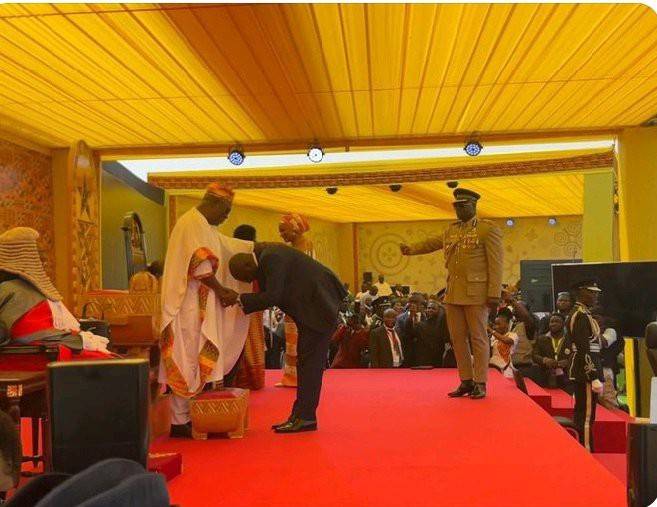A recent video from Ghana has taken the internet by storm, sparking debates and mixed reactions from citizens. The video shows Vice President Dr. Mahamudu Bawumia bowing in front of the President-elect, John Dramani Mahama, during a public ceremony. This moment, filled with symbolism, has ignited conversations about respect, humility, and the complex dynamics of Ghanaian politics.
In the video, Dr. Bawumia, who currently serves as Vice President under the government of President Nana Akufo-Addo, approaches former President Mahama. As a gesture of respect, he bows before Mahama, who is set to lead Ghana as the new President. This simple act has caused a whirlwind of opinions on social media, with supporters and critics passionately sharing their thoughts.
Many people praised Bawumia’s gesture as a sign of maturity and respect. To them, it showed that Ghanaian leaders could rise above political rivalries and work towards unity. Supporters of the ruling New Patriotic Party (NPP) argued that this was a powerful display of leadership and humility. They believe that Bawumia's action sends a strong message of reconciliation and mutual respect, values they think are necessary for the country's progress.
On the other side, critics viewed the gesture differently. Some saw it as a sign of weakness, pointing to the heated political rivalry between the New Patriotic Party (NPP) and the National Democratic Congress (NDC). These critics argue that the bowing might not be genuine, but rather a calculated move to win over supporters of the opposition. For them, this act of humility might be nothing more than political strategy, aimed at softening the perception of the ruling party in the eyes of the public.
Others were quick to dismiss the gesture entirely, arguing that it does little to address the real challenges Ghana faces. They pointed out that the country’s political issues, such as economic struggles, unemployment, and corruption, require more than symbolic acts to solve. While the bowing might seem like a moment of peace, they say it does not change the deep divides and pressing concerns within the nation.
Despite the different interpretations, one thing is clear: this moment has brought a spotlight to the role of gestures in politics. In Ghana, small actions like handshakes, smiles, or even bowing can carry deep meanings. These gestures often go beyond their surface and reflect larger cultural values and political undertones. In this case, Bawumia’s bow has become a symbol for different things to different people, making it a hot topic for debate.
Some political analysts have weighed in, noting that the gesture might represent a step toward bridging the gap between the two major political parties in Ghana. Over the years, the rivalry between the NPP and NDC has often created division among citizens. Moments like these, they argue, could pave the way for greater cooperation and less hostility in Ghanaian politics.
However, others argue that such symbolic gestures alone cannot bring real change. They emphasize the importance of addressing the root causes of the country’s challenges, such as poverty, lack of infrastructure, and inequality. While gestures of respect are good for optics, they say true progress comes from concrete policies and actions that improve the lives of Ghanaians.
Social media platforms have become the battleground for this debate. Supporters of both parties have shared their views, with some defending Bawumia’s actions as a sign of good faith, while others see it as a move that exposes political weakness. Memes, tweets, and posts analyzing the video have flooded timelines, keeping the conversation alive.
One of the key takeaways from this incident is the power of symbolism in politics. Politicians, whether in Ghana or elsewhere, often use public gestures to send messages. These actions can influence how people see their leaders, shaping public perception in ways that words alone cannot achieve.
For Ghanaians, the video has added another chapter to the ongoing story of their political landscape. It has sparked discussions about what leadership truly means and how politicians should conduct themselves. While some see the bowing as a refreshing moment of humility, others view it with skepticism, questioning its sincerity and purpose.
In the end, this incident serves as a reminder that politics is not just about speeches and policies; it is also about the subtle gestures that carry deep meaning. Whether you see Bawumia’s bow as a genuine act of respect or a calculated political move, it has certainly left an impression. As the conversation continues, one thing remains certain: Ghana’s political journey is full of surprises, and moments like this keep the nation talking.




No comments yet
Be the first to share your thoughts!